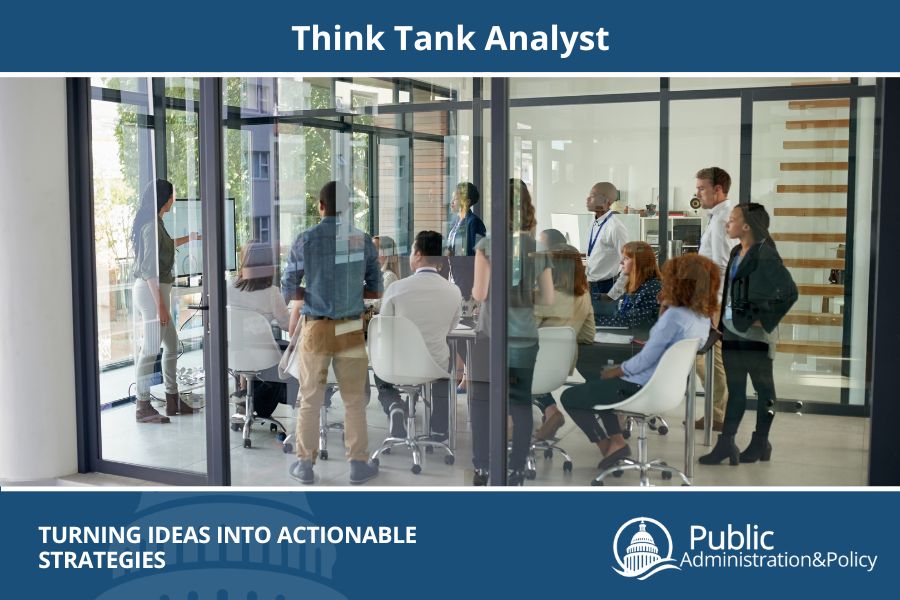How to Become a Think Tank Analyst
Dive Deep Into Research and Innovation to Solve the World’s Toughest Challenges With Data-Driven Insights
Think Tank Analysts are the intellectual backbone of public policy and societal progress, using rigorous research and data-driven insights to tackle complex global and local challenges. These professionals analyze trends, evaluate the impact of current policies, and offer actionable recommendations to policymakers, organizations, and governments. Their work spans a wide range of critical issues, including economic development, healthcare reform, climate change, and social justice, making their role pivotal in driving informed decision-making.
For those passionate about research, critical thinking, and influencing meaningful change, a career as a Think Tank Analyst offers an intellectually rewarding path. This guide will explore the journey to becoming a Think Tank Analyst, detailing the education and skills required, key responsibilities, and opportunities to contribute to transformative policy development and implementation.

Table of Contents
What Is a Think Tank Analyst?
A Think Tank Analyst is a research professional who works within organizations focused on policy development and analysis. These analysts conduct in-depth research on public policy issues, often collaborating with social sciences, economics, and public affairs experts to produce actionable recommendations. They work on various topics, including environmental policy, economic reform, healthcare systems, and emergency management.
Key Responsibilities
- Research and Analysis: Gathering data, interpreting trends, and drafting evidence-based policy briefs.
- Collaboration: Working with civil servants, elected officials, and subject matter experts to refine research findings.
- Advocacy: Presenting research findings to stakeholders influencing public policy decisions.
- Publishing: Writing white papers, journal articles, and op-eds to communicate findings effectively.
Think Tank Analysts are employed in various sectors, including nonprofit, public, and private organizations. Many focus on specific policy domains, such as economic development, environmental sustainability, or international relations.
“The best public policy is made when you are listening to people who are going to be impacted.”
— Elizabeth Dole, Former U.S. Senator and Public Servant
Step 1: Complete Your Degree
A strong academic foundation in social sciences or public policy is essential to pursue a career as a Think Tank Analyst. Most entry-level roles require a bachelor’s degree, but advanced positions often demand a master’s degree or even a Ph.D.
Recommended Degrees for Think Tank Analysts
- Bachelor of Public Policy: Provides a foundation for governance, public affairs, and data analysis.
- Master of Public Administration (MPA): Focuses on leadership, budgeting, and public sector management.
- Master of Public Policy (MPP): Emphasizes advanced policy analysis and problem-solving skills.
- Ph.D. in Public Policy: Prepares professionals for research, academia, and high-level policy advising roles.
Why Choose Online Programs?
Online programs offer flexibility for working professionals and students who balance personal responsibilities. Institutions in the United States increasingly offer online MPA and MPP degrees, allowing students to specialize in areas like emergency management, public service, and nonprofit management.
Explore programs like the Bachelor of Public Policy or Master of Public Administration for more details.
Step 2: Learn About Think Tank Analyst Salaries
Think Tank Analysts’ salaries vary widely based on education, specialization, and experience. Entry-level positions often serve as stepping stones, with significant growth potential as analysts gain expertise and move into leadership roles.
Salary Ranges for Think Tank Analysts
- Entry-Level Analysts: $50,000–$65,000 annually.
- Mid-Career Analysts: $70,000–$90,000 annually.
- Senior Analysts or Directors: $100,000+ annually.
Factors Affecting Salary
- Educational Background: Master’s degrees often lead to higher starting salaries.
- Geographic Location: Think tanks in major metropolitan areas, such as Washington, D.C., tend to offer higher salaries.
- Specialization: Areas like economic policy and international relations often command higher pay due to demand.
Visit the Bureau of Labor Statistics (BLS) for detailed salary insights for related policy roles.
Step 3: Build Necessary Skills
Success as a Think Tank Analyst requires technical expertise, communication skills, and a strong understanding of public affairs and governance.
Key Skills for Think Tank Analysts
- Quantitative Research: Proficiency in data analysis tools like SPSS, R, or Stata.
- Writing and Communication: Crafting policy briefs, op-eds, and reports.
- Collaboration: Working with various stakeholders, including civil servants and elected officials.
- Public Speaking: Presenting findings at conferences, webinars, or legislative hearings.
Analysts are encouraged to participate in professional development opportunities, such as workshops and certifications, to stay updated on best practices and tools.
Step 4: Find a Think Tank Analyst Job
Finding a Think Tank Analyst job requires strategic networking and familiarity with the job market. Government agencies, nonprofit organizations, academic institutions, and private consulting firms employ analysts.
Industries Employing Think Tank Analysts
- Nonprofit Sector: Advocacy groups, research institutes, and international NGOs.
- Public Sector: Government agencies at local, state, and federal levels.
- Private Sector: Corporations with public policy divisions or consulting arms.
Notable Employers
Check platforms like Idealist and LinkedIn for job postings.
Career Opportunities in Think Tank Analysis
Think Tank Analysts can grow their careers in various ways, from transitioning into policy advising roles to leading large-scale research initiatives. Many analysts move into adjacent fields, such as nonprofit management, government consultancy, or academia.
Prominent employers often offer opportunities for professional growth, such as positions in research leadership, program management, or specialized policy domains.
Sources
- Bureau of Labor Statistics (BLS). “Occupational Outlook Handbook: Policy Analyst Careers.” https://www.bls.gov
- National Center for Education Statistics (NCES). “College Navigator.” https://nces.ed.gov
- U.S. News & World Report. “Best Public Policy Programs.” https://www.usnews.com
Acknowledgments
Content inspired by insights from nonprofit organizations, government agencies, and academic institutions. Special thanks to think tanks like the Brookings Institution, RAND Corporation, and Pew Research Center for shaping the field of policy analysis.
